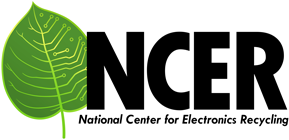Why Recycle Electronics?
To conserve natural resources.
Valuable material can be recovered and reused!
To support the community.
Donating your old electronics supports schools, low-income families, and non-profits by providing needed electronics.
To create local jobs.
As demand for electronics recycling increases, new businesses will form and existing companies will grow.
To protect public health and the environment.
Most electronics contain hazardous materials that should not be disposed of in landfills.
How Are Electronics Recycled?
There are currently two dominant approaches to recycling used electronic products: demanufacturing (or manual dismantling) and shredding.
Demanufacturing
Demanufacturing involves manually dismantling the electronics in order to market the recyclable raw materials/products that are found. The dismantling process yields more components that can be reused in secondary markets. Demanufacturing/dismantling is most usually done by trained technicians who use a variety of machine and hand tools.
Shredding
Shredding involves a minimal amount of manual sorting and separation of components. In the shredding process, electronics are loaded into large pieces of shredding equipment. The shredding process allows recyclers to recover the maximum value from the recyclable metals in used electronics. Shredding operations employ fewer workers since most of the work is accomplished by large pieces of equipment.
How Do I Recycle Electronics?
NCER is not a provider of electronics recycling services, although we have held collection events in our home state of West Virginia. Please see the search engine listed below to find an electronics recycler in your area.
- Greener Gadgets Directory – http://greenergadgets.org
Important Considerations:
Reuse is Preferable, but Don’t Dump Your Junk!
The NCER encourages reuse of working, newer equipment as the first option for used electronic equipment. However, many reuse programs are unable to handle broken or severely outdated equipment. It is always advisable to call ahead to see if your used equipment meets the program’s needs.
Protect Your Data
If you are reusing or recycling a laptop or desktop computer, your personal data could still be on your hard drive. Most recyclers have hard drive wiping policies, but it is always in your best interest to protect your personal information by erasing or destroying your hard drive. There are many hard drive wiping software programs available. You can read more about the importance of hard drive erasure as well as do a comparison of some of the more popular software programs by going to Tech Soup’s website at: https://www.techsoup.org/support/articles-and-how-tos/preventing-data-theft
Call Ahead
Many recyclers are not set up to take small loads of computer and electronic equipment – many deal strictly in e-cycling on a commercial level. As a result, you should contact recyclers ahead of time to ensure that they can receive your equipment.
